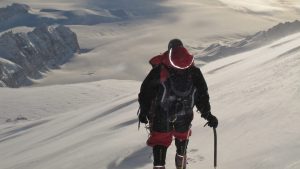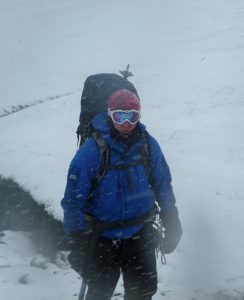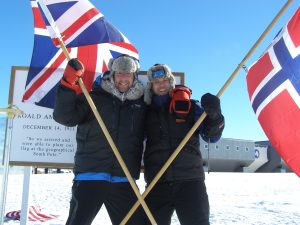
Q: You’ve taken on some immense challenges to raise money for Tusk. What drives you?
It all started with a skydive challenge in March, followed by the Lewa Safari Marathon in June. Now I’m in training for the Wildlife Ranger Challenge in September, all to raise vital funds for Tusk.
In terms of what drives me, over the last 35 years I have been very fortunate to have travelled extensively in Africa, enjoying many varied experiences ranging from self-drive safaris, to climbing volcanoes and even spending time on a lion research project. Through these experiences I have had some incredible wildlife encounters.
Hearing that 96 elephants are being killed daily and that there are only now about 400,000 left in the wild was enough motivation for me to dedicate my time to raising funds and awareness of the plight of the African Elephant.
In September 2021, I made the radical decision to give up full time employment as a director of a major Plc after 22 years, to instead focus my time on elephant conservation. Many of my friends, family and colleagues were initially shocked by my decision, but when I explained my reasoning and that it was something I had been thinking about for some time, they soon understood why.
As Sir David Attenborough said “we all need to take responsibility for conservation and not just leave it to the few.”
Q: Has fundraising always been part of your life?
To date, I think I’ve raised somewhere between £250,000 and £300,000 for a whole variety of charities through challenges and events, including Help for Heroes, Lincs and Notts Air Ambulance, Save the Rhino and many other worthy causes.
So yes, fundraising is important to me. It’s not just the money that you raise which is important, it’s also the time you invest in trying to make a difference. As an example, until recently I was a trustee of our local Air Ambulance service who do amazing work and offer a vital service to the community. I have undertaken quite a few challenges to raise funds for them in the past. In 2019 I was very honoured to be voted the “Charity Volunteer of the Year” at the “Air Ambulances Awards of Excellence”. This was particularly special to me, as an independent panel representing all 21 Air Ambulances in the UK voted for this decision. It’s not why I do it, but it’s extra special when the pilots, doctors and charity teams across the UK appreciate what you do.
Q: Well we absolutely appreciate what you do! What has been your most difficult challenge so far?
 From a very early age I have always been up for a challenge. It started with parachuting and marathons, then on to more exotic and adventurous undertakings which have literally taken me around the globe – from the coldest places on the planet to the warmest, including the Geographic North and South Poles, Himalayas, South Georgia, Greenland, and the Lut Desert in Iran to name but a few. These are charity challenges of my own making. I believe that if I have the privilege of travelling to these amazing places, then I should share the experience with others and raise money for good causes at the same time.
From a very early age I have always been up for a challenge. It started with parachuting and marathons, then on to more exotic and adventurous undertakings which have literally taken me around the globe – from the coldest places on the planet to the warmest, including the Geographic North and South Poles, Himalayas, South Georgia, Greenland, and the Lut Desert in Iran to name but a few. These are charity challenges of my own making. I believe that if I have the privilege of travelling to these amazing places, then I should share the experience with others and raise money for good causes at the same time.
Quite a few of my challenges have been exploratory and few people have ever undertaken them, such as Greenland, Democratic Republic of Congo and The Lut Desert in Iran. By their very nature, there are lots of unknowns and potential hazards. But if I had to pick my most difficult challenge so far, I would have to say that it would be making the first winter attempt to climb the Arctic’s highest mountains, which are located in a very remote area of southern Greenland. The Arctic winter is brutal, with crippling cold temperatures (minus 20 degrees in the tent!) and hurricane force winds, which all made for a gruelling, yet epic trip. We did manage to climb one of the big peaks which we named “Thor’s Gate” after the Norse God of thunder and lightning.
Q: Any particularly memorable moments from your challenges?
Well, where do you want me to start?! Probably too many to tell – I could tell you about bears, frostbite, building an ice runway for an evacuation in Antarctica, dodging Afghan drug smugglers in the desert and many more. But I think one of the more unusual and least expected must be the tale of the frozen Mars bars!
Unfortunately, back in 2006 while skiing to the Geographic North Pole, one of our 6-person team became unwell, which resulted in us trying to get an evacuation organised. This is very difficult to do on the Arctic Sea ice and is totally dependent on finding a suitable weather window for a helicopter to land. Pulling heavy loads on the ice takes up a lot of energy. In fact, somewhere between 4,000 to 5,000 calories per day. So, one of our food sources was delicious Mars bars which are high in calories and, being kept in the sledges, they become deep frozen.
After a long day’s skiing we finally received a message from the air base that the helicopter was on its way. We pitched the two tents and took a stash of Mars bars inside to eat that evening. We had given the pilot a GPS location from our tent and eventually we could hear the large helicopter approaching. The sound got nearer and nearer and when we looked out of the tent, we were horrified to see that the helicopter was hovering a metre or two directly above. The downforce from the spinning rotors started to flatten our tent and completely blew away the second one. After a lot of frantic hand waving and shouting, the pilot finally realised what he was doing and immediately started to ascend. This then had the opposite effect, as everything in the tent was flying around, including our beloved supply of frozen Mars bars.
They were all sucked up in the spinning rotors and were ricocheting around our heads in all directions while we clung to our small tent, which was also lifting off the ground. Thankfully, the evacuation was a success. When the helicopter finally disappeared, we spent the next three hours collecting all our possessions, which had been scattered in all directions, and nursing mild frostnip as a result of clinging so tightly to the tent in the windchill created by the helicopter. We were left with a tent (which was our lifeline in such harsh conditions) with a huge hole which made the rest of the trip a little chilly.
to our small tent, which was also lifting off the ground. Thankfully, the evacuation was a success. When the helicopter finally disappeared, we spent the next three hours collecting all our possessions, which had been scattered in all directions, and nursing mild frostnip as a result of clinging so tightly to the tent in the windchill created by the helicopter. We were left with a tent (which was our lifeline in such harsh conditions) with a huge hole which made the rest of the trip a little chilly.
Of all the things that you plan for on a trip to the North Pole, including bears, frostbite, immersion in icy water … being struck by a flying deep frozen Mars bar certainly wasn’t one of them!
Q: You’ve completed challenges for lots of charities. Why is wildlife conservation important to you?
Being born and raised in the English countryside, I have always been interested in wildlife conservation. I spent my youth making bird boxes, watching badgers and raising a range of injured animals including crows, weasels, and hedgehogs. My dream at school was to try and become a wildlife film maker, but at that time, this wasn’t really an option – although subsequently one or two of my colleagues went on to make a success of it.
Now more than ever before, wildlife conservation is so important. With shrinking biodiversity around the world, we need to provide space for these endangered species to coexist alongside the expanding human population. I feel that I have been very lucky during my lifetime to visit what I would call true wilderness areas where nature is still relatively undisturbed by human intervention. I want to do my bit by raising funds and awareness to ensure that future generations can enjoy the same experiences. One of the things I find most rewarding is speaking to younger and older generations about the great strides and positive initiatives which are being adopted so they can see that not everything is negative. There is something worth saving, but once it’s gone, it ain’t coming back!
Q: You’re now gearing up for the Wildlife Ranger Challenge – what distance are you going for and how will you prepare?
In 2017 I travelled to the Democratic Republic of Congo to make the ascent of the four highest volcanoes in the Virunga reserve – the oldest national park in Africa and home to mountain gorillas. My guides were the Virunga Park Rangers who face hostility on an almost daily basis, with over 200 rangers killed in the line of duty. It was a real privilege for me to spend time with them and to see first-hand the important work they are doing and the issues they face.
I used this opportunity to raise funds for “The Fallen Rangers Fund” which provides support and employment for a ranger’s family if he or she is killed on the frontline of conservation. We witnessed how fluid and dangerous the conditions are in Virunga. We had to change our plans several times due to the presence of rebel groups operating in the area.
But what sticks with me is just how professional and passionate the rangers were about their work. I know it’s the same for all ranger forces across Africa, so for me, it’s a real pleasure to now be gearing up to take part in and support the Wildlife Ranger Challenge.
Luckily having completed the Lewa Safari Marathon in June, I still have a level of fitness I can draw upon for the Wildlife Ranger Challenge and my training has already begun. My plan is that I will be aiming for the full 21km distance and carrying a 22kg rucksack with probably a little more walking than running. It is certainly not going to be easy and I will have to draw on my past experiences of carrying heavy loads and pulling sledges to get me through.
My training program is to build up steadily by carrying lighter loads and then increasing the weights and distances covered. I intend to fill my rucksack with items I have to hand, so that is presently a sack of chicken feed weighing in at 20kg and it feels very heavy!
The training route I use is on an old Roman track known as “The High Dyke.” As I trundle along I think of all those Roman Legionaries wearing full metal armour which makes me feel a little better!
Q: What would you say to people who are thinking about signing up for a fundraising challenge?
Make sure you prepare in advance and give it 100%.
There are really three phases to most of these challenges. Firstly, finding the time, secondly the training, and thirdly the fundraising. Each one is as important as the other and all need to be addressed if your challenge is going to be successful. For example, when you are working full time and also have other family commitments, finding the time to train is challenging, but I found that whatever the time of day or the weather you need to get out there come what may. Sometimes I would be running or cycling at 5am in the morning or at 9pm in the evening up to 6 days a week, but it’s worth in the end.
Believe in the cause you are raising funds for. I often found on my trips that one of my biggest fears was not the danger of the challenge itself, but instead not being able to complete it and so letting down my chosen charity and my generous sponsors. Use this fear to help motivate you and complete the challenge.
Equally if you believe in the cause and are passionate about it, the enthusiasm will rub off on others and they will support you in your fundraising. The Tusk challenges such as the Lewa Safari Marathon and Wildlife Ranger Challenge are very worthy and different. Because of this they are an excellent “hook” to attract donations.
But most importantly, train hard so that come the day of the event, you can smile and ENJOY the challenge. It should be fun! And remember you are making a real difference.
Q: Any good fundraising tips?
- Get organised and prepare
- Contact family, friends, clients, colleagues, the general public and explain what you are doing and why
- Set yourself a target – be bold but achievable
- Use social media, formal letters, telephone – whatever source you can think of
- Approach your local schools, clubs and other organisations and get them involved – offer to give them a talk or presentation on completion of your challenge. I spent two days at a very large school giving 8 x 40-minute talks on the DRC to all the classes in the school. They were very enthusiastic and asked some great questions
- Always try and approach different people and organisations for sponsorship and not the same ones each time you take on a challenge. It’s a difficult one, but you want to ensure you don’t get sponsor fatigue and more importantly that you still have some friends left!
- Finally, and most importantly, inform your sponsors about the challenge and why are you doing it. What does it involve? Once completed always, always say THANK YOU!

